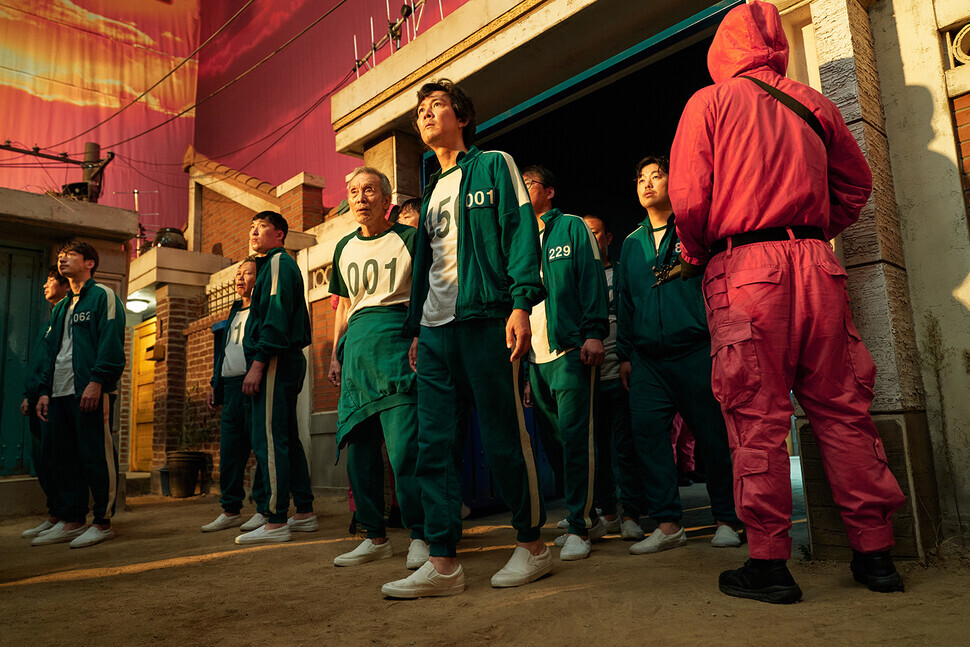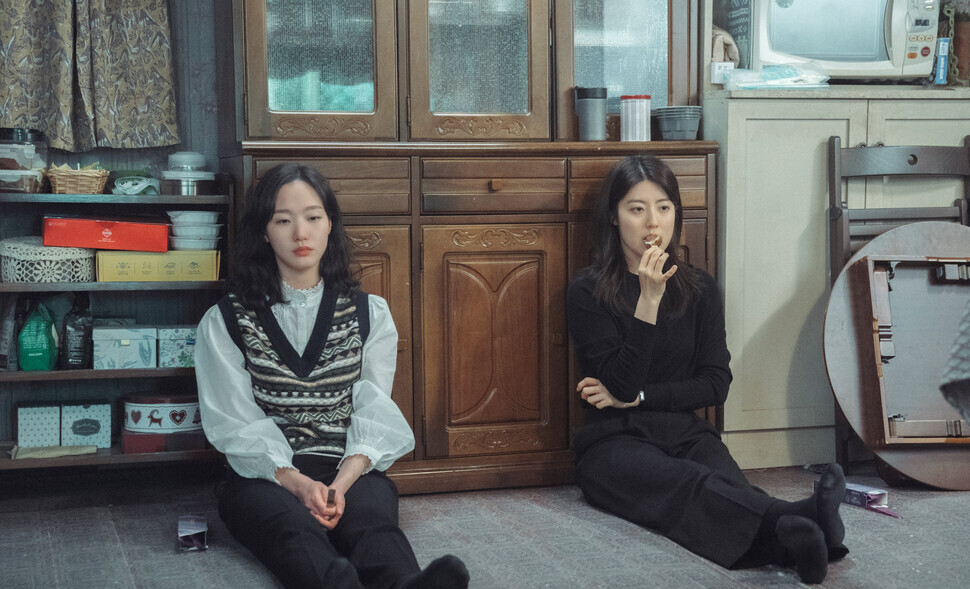hankyoreh
Links to other country sites 다른 나라 사이트 링크
Today’s K-culture no longer needs the “K” qualifier

“I truly hope ‘Squid Game’ won’t be the last non-English series to be here at the Emmys,” said Hwang Dong-hyuk, director of “Squid Game,” after becoming the first director to be honored at the Emmys for a series not in English last week.
The six Emmys won by “Squid Game” — including not only Outstanding Directing for a Drama Series (Hwang Dong-hyuk) but also Outstanding Guest Actress in a Drama Series (Lee You-mi) and Outstanding Lead Actor in a Drama Series (Lee Jung-jae) — represented the pinnacle of the numerous records that the Netflix show has set since its release on Sept. 17, 2021.
“Squid Game” topped the charts in 82 of 83 countries where Netflix is available. It also stayed at number one longer than any other series.
Popularity of Korean shows is no passing fad“Squid Game” isn’t an end, but a beginning. It has paved the way not only for a second season, but also for other shows of its kind.
Following “Squid Game,” the shows “Hellbound” and “All of Us Are Dead” raced to the top of the Netflix chart even faster.
At the moment, “Narco-Saints,” directed by Yoon Jong-bin, ranks at No. 3 on Netflix’s global chart.
That’s not the only series getting views around the world. Global audiences are also getting into series that make Koreans like producer Lee Jin-suk scratch their heads in surprise. That could be said for shows like “Extraordinary Attorney Woo” and “Young Lady and Gentleman.”
“Extraordinary Attorney Woo” ranked No. 1 in 13 countries in August 2022, and “Young Lady and Gentleman” reached No. 1 among global content in countries including Indonesia and Qatar.
“Young Lady and Gentleman” is a KBS series broadcast on weekends about a romance between a young woman and a middle-aged man who loses his memory.
I’d assumed that “Squid Game” would be ephemeral, but the past year shows it’s become an enduring trend. That’s because “Korean media is enjoying systemic success,” explained Kim Bong-seok, a film critic.

Both “Parasite,” directed by Bong Joon-ho, the first Korean film to win an Oscar, and “Squid Game,” the first Korean show to win an Emmy for directing, stand apart from other media both in terms of their writers and the system behind them.
That system can be characterized as a mishmash. Despite their common goal of creating content, the people making them hail from diverse backgrounds. “Squid Game” director Hwang Dong-hyeok and producer Kim Ji-yeon had worked together on an earlier film (“The Fortress”), while Chung Seo-kyung, writer of “Little Women” (which is currently No. 1 on Netflix Korea) collaborated with director Park Chan-wook on his films “Lady Vengeance” and “Decision to Leave.”
The show “Hellbound” was adapted from a Naver webtoon by cartoonist Choi Gyu-seok and directed by Yeon Sang-ho, who has made both animated and live-action films. “All of Us Are Dead” is another show based on a webtoon found on Naver, originally released in 2009.
The stories told by these shows are just as jumbled as their producers. Even though the director and producer of “Squid Game” had worked together on a very Korean film (“The Fortress”), they brought in elements of the Japanese “survival” genre, exemplified by “Gambling Apocalypse: Kaiji,” “Liar Game,” and “Battle Royale.”
Chung Seo-kyung wrote her first TV screenplay for “Mother,” a remake of a Japanese series by Yuji Sakamoto. “Little Women” is a radical mishmash of genres including thriller, horror, romance, young adult, revenge and Korea’s unique brand of “makjang” — over-the-top soap opera.
“Hellbound” transports the classic creativity of comic books to the screen, while “All of Us Are Dead” is one of many zombie series that go back to Hollywood.
Korea’s media mishmash seasoned with a dash of intellectThe creatives working in this system are part of the generation who were coming of age when the insurgent Korean cultural industry was on the rise in the late 1990s.
“The previous generation was raised on auteurism and watched films in the cinematheque. To make a generalization, the previous generation viewed ideology and class as important, while this generation is free of nationality and ideology. Whereas popular culture from the West arrived pretty late for the previous generation, these people experienced it contemporaneously as they were growing up,” said Kim Bong-seok, the critic.
“Squid Game” director Hwang Dong-hyeok (1971), producer Kim Ji-yeon (1975), “Little Women” writer Chung Seo-kyung (1975), “Hellbound” director Yeon Sang-ho (1978) and comic artist Choi Gyu-seok (1977) — all were born in the 1970s.
This type of fusion is also evident in K-pop. As the name suggests, K-pop is a style of music defined not by genre but by nationality. That allows all kinds of generic permutations. A single song can start with EDM, leap to a rap interlude, and then climax with high notes cribbed from ballad or rock, while the artists dance in unison. The jumps between genres are quick, even instantaneous.
It’s ironic that a style named after a single country could represent such a hodgepodge.
“In Hollywood, action films have action, comedy films have comedy, and romance films have romance, but that doesn’t seem to be enough in Korea. Action films include social criticism, and romantic affairs are depicted with emotional honesty. Even erotic films reflect the frustration felt by the young generation. That’s been true of Korean media throughout history,” said Cha Woo-jin, a cultural critic.
Another characteristic of Korean media, according to Cha, is its “intellectual” seasoning. “Korea is a place where album orientation and lyrical symbolism are even added to dance music.”
According to a New York Times analysis of the global popularity of “Squid Game” on Oct. 6, 2021, “‘Squid Game’ is only the latest South Korean cultural export to win a global audience by tapping into the country’s deep feelings of inequality and ebbing opportunities.” That kind of story is also relatable to people in the US and other countries, the article noted.
“If Hollywood’s main characters are your average Joe, Korea’s main characters are poor. Polarization has become a global slogan, and encroaching capitalism is pushing more people into poverty and leading them to dream about making it rich,” said Lee Jin-suk, explaining why the trend has continued.

Cha observed that, contrary to Korean media’s hoopla over everything “K,” the big win at the Emmys represents the advent of a world without borders.
“People must be confused. “Squid Game’ belongs to us, but it won awards at a contest for American TV shows.”
The reason that Apple spent 400 billion won making “Pachinko” is “not because it’s a Korean story, but because it’s an appealing story,” Cha said. Similarly, a Korean series was able to win prizes at the Emmys not because it’s Korean but because it’s been “globally integrated.”
Genres like K-drama, K-pop and K-culture were labeled with a “K” because they represented something that hadn’t existed before. But now, thanks to Korea’s dramatic success at the Emmys, those same genres are losing their “K” and merging with the global mainstream — into the world of online streaming that might seem to be infinitely equal, but is actually framed by massive corporations.
By Ku Dool-rae, staff reporter
Please direct questions or comments to [english@hani.co.kr]

Editorial・opinion
![[Guest essay] Preventing Korean Peninsula from becoming front line of new cold war [Guest essay] Preventing Korean Peninsula from becoming front line of new cold war](https://flexible.img.hani.co.kr/flexible/normal/500/300/imgdb/original/2024/0507/7217150679227807.jpg) [Guest essay] Preventing Korean Peninsula from becoming front line of new cold war
[Guest essay] Preventing Korean Peninsula from becoming front line of new cold war![[Column] The state is back — but is it in business? [Column] The state is back — but is it in business?](https://flexible.img.hani.co.kr/flexible/normal/500/300/imgdb/original/2024/0506/8217149564092725.jpg) [Column] The state is back — but is it in business?
[Column] The state is back — but is it in business?- [Column] Life on our Trisolaris
- [Editorial] Penalties for airing allegations against Korea’s first lady endanger free press
- [Editorial] Yoon must halt procurement of SM-3 interceptor missiles
- [Guest essay] Maybe Korea’s rapid population decline is an opportunity, not a crisis
- [Column] Can Yoon steer diplomacy with Russia, China back on track?
- [Column] Season 2 of special prosecutor probe may be coming to Korea soon
- [Column] Park Geun-hye déjà vu in Yoon Suk-yeol
- [Editorial] New weight of N. Korea’s nuclear threats makes dialogue all the more urgent
Most viewed articles
- 1[Guest essay] Preventing Korean Peninsula from becoming front line of new cold war
- 2After 2 years in office, Yoon’s promises of fairness, common sense ring hollow
- 360% of young Koreans see no need to have kids after marriage
- 4Yoon’s broken-compass diplomacy is steering Korea into serving US, Japanese interests
- 5[Column] Why Korea’s hard right is fated to lose
- 6S. Korean first lady likely to face questioning by prosecutors over Dior handbag scandal
- 7Is Japan about to snatch control of Line messenger from Korea’s Naver?
- 8[News analysis] Jo Song-gil’s defection and its potential impact on inter-Korean relations
- 911 years after US decamped, military base in Busan still festering with pollution
- 10[Editorial] The ideals of the Korean Provisional Government are still threatened today